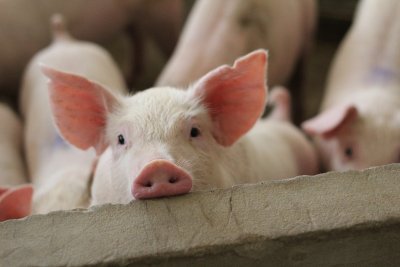News • Sustainable Farming Campaign
Loss of abattoirs could mean end of locally sourced meat
The UK’s network of small local abattoirs is near collapse. Without urgent action there will be a huge loss of consumer choice because the marketing of locally-produced, traceable meat will no longer be possible in many parts of the country.

A new report from the Sustainable Food Trust warns that this is due to the ongoing closure of many smaller local abattoirs and the high financial, environmental and animal welfare cost of transporting relatively small numbers of farm animals further to get them slaughtered and then transporting the meat back to the farm of origin. [1]
Over the last decade more than a third of small abattoirs have closed. In England there are just 63 small abattoirs left, down from 96 in 2007. Two further small abattoirs have already closed this year in Scotland. In total the number of all red meat abattoirs has fallen to 249 from 320 in 2007 and almost 1,900 in 1970. Many of these, however, are unsuitable for local meat marketing. [2]
The reasons for the continuing closures include the disproportionately high burden of regulation imposed on small abattoirs, falling cattle numbers nationally and the currently very low and often negative profitability of the sector due to the increasing dominance of supermarkets. [3a, b and c]
The Sustainable Food Trust is calling on government to:
- Make a clear statement of support that it recognises the vital importance of smaller abattoirs, and make this a matter of practical policy across all government departments and agencies;
- Work constructively with interested parties to make possible the use of mobile and small static red meat abattoirs for on-farm slaughtering;
- Set up a task force with joint government, industry and consumer representation, to establish why small abattoirs are closing and propose innovative and practical solutions to ensure their survival.
The ideal for many producer-retailers would be a mobile abattoir which comes to their farm periodically. A number of countries within the EU and also Canada, New Zealand and America currently have mobile abattoirs successfully operating within tight regulatory regimes that enhance animal welfare and bio-security. The Sustainable Food Trust believes mobile abattoirs would have advantages for animal welfare and could become viable in the UK, with the use of CCTV cameras and constructive government and regulatory engagement. [4]
Richard Young, policy director of the Sustainable Food Trust and a co-author of the report said, “Local abattoirs play a vital role in all rural communities where farm animals are kept. When they close, both animals and meat have to be transported much further. This is bad for animal welfare and bad for the environment. It also threatens the ongoing renaissance of local food cultures."
"On my own organic farm, I have had to change abattoirs nine times over the last 30 years in order to keep our farm shop supplied with the meat from our own animals, as seven of those closest to me have closed and two became unsuitable for other reasons. I now have to take our animals almost 40 miles to get them slaughtered and it costs a great deal to get the carcases delivered back to our shop.”
Phil Stocker, chief executive of the trade body, the National Sheep Association said, ‘This timely report draws attention to the rapidly changing and complex crisis facing smaller local abattoirs and those who depend on them. I truly hope that government and industry will work together to offer a long-term future for our diminishing network of local abattoirs before it is too late.”
Peter Stevenson, chief policy advisor for the animal welfare charity, Compassion in World Farming said, “For several decades we have witnessed the gradual erosion of the UK’s network of small local abattoirs. Farmers who want to minimise travelling times have been unable to prevent their animals being taken on longer journeys to distant slaughterhouses as local facilities disappear. This is clearly not in the best interest of the animals’ welfare. Government must act to help reinstate local abattoirs. Eating food produced locally and supporting local farmers and businesses are rightly viewed as important aspects of sustainability.”
Small local abattoirs also provide a wide range of other benefits for local communities. [5] The current situation also provides poor value for taxpayers, argues the Sustainable Food Trust. The UK has invested heavily, through a range of grant schemes, in encouraging farmers to diversify, and on-farm retailing of meat has been one of the major options taken up. However, despite the considerable investment of public money that has been made, the government has taken little effective action to prevent the closure of local abattoirs, on which the local marketing of meat depends.
The report, A Good Life and a Good Death – Re-localising farm animal slaughter is published on 26 February 2018
For further information contact:
- Megan Perry: megan@sustainablefoodtrust.org
- Bonnie Welch: bonnie@sustainablefoodtrust.org
Report authors:
- Richard Young: richard@sustainablefoodtrust.org
- Bob Kennard: bobkennard51@gmail.com
For information on mobile abattoirs:
- Paddy Hoare: paddy@perdixpartnership.co.uk
Notes for editors
- Although some local producers are still within reasonable travelling distance of an abattoir which will slaughter livestock for them and return the carcases to them, others are being forced to take their animals further every time a local abattoir closes. Some of the most extreme examples relate to Orkney which no longer has an abattoir and livestock have to travel by boat and road to abattoirs on the mainland and the Isle of Skye, where despite strong local interest it has not proved financially viable to build an abattoir. One mainland Scottish farmer stated “If we sell direct to Morrisons we go to [the abattoir at] Turriff about 32 miles, but to do private kill we would have to go to Dingwall which is about 150 miles! So, we no longer are able to market our meat direct to the consumer as it is not feasible financially, even though we have a ready and willing market for our produce.”
- Many larger abattoirs are not willing or able undertake private kill, that is slaughter animals for farmers and return the carcases to their farm shops or local butchers. Others are unsuitable for producer-retailers because they slaughter animals without pre-stunning for a specific sector of the Halal meat trade. In addition, less than a quarter of abattoirs are certified for slaughtering organic animals.
- Commentary on farms as small businesses:
- a. As with many small businesses, the burden of paperwork and regulation poses a greater administrative burden on smaller abattoirs than on large ones. The regulation was also predominantly drawn up with large abattoirs in mind and much of it is unnecessary or inappropriate for smaller abattoirs.
- b. Supermarkets are supplied by the largest abattoirs which can slaughter very large numbers of animals each day. Many of these were built with the aid of substantial grants. The 2 Sisters slaughterhouse near Merthyr Tydfil, which supplies Tesco, was opened in 1999 and built and equipped with the aid of almost £8 million pounds in grants, worth over £13 million pounds in today’s money. This has resulted in over-capacity in the slaughtering sector and this is creating strong competition between slaughterhouses with price under-cutting and cattle and sheep transported from all over Wales, Scotland and England to supply this abattoir in South Wales. What is happening in the meat sector is very similar to what has happened with milk in recent years. Supermarket price wars have forced slaughterhouses to undercut one another, and economies of scale have allowed the largest to increase market share at the expense of the smallest.
- c. There has also been a large amount of vertical integration, with some large meat companies buying up hides and skin companies. It is not yet clear however, if this is a reason for the very low prices currently to small abattoirs for hides and skins compared to prices achieved by the largest abattoirs.
- Several groups of producers in areas poorly served by smaller abattoirs are currently exploring the possibility of using mobile abattoirs. These are permitted under EU regulations but when two prototypes were built and operated in the 1990s they failed financially due to the high costs of inspection at the time and the very high capital costs for participating farmers due to a requirement that when operating a mobile abattoir had to comply with all aspects of a slaughterhouse producing meat for export. One group of producers led by Fir Farm in Gloucestershire and coordinated by land agent Paddy Hoare has undertaken a survey locally to establish levels of interest and is currently at the design stage, see Chapter 8 of the report.
- Smaller local abattoirs also provide skilled local jobs and are a catalyst for other related businesses, helping to keep the added financial returns from meat processing within local rural communities; and providing opportunities for the sons and daughters of local livestock farmers to increase farm income, enabling them to remain on, or return to, their family farm.
Published Monday 26 February 2018
Sustainable Farming Campaign: Sustain encourages integration of sustainable food and farming into local, regional and national government policies.





